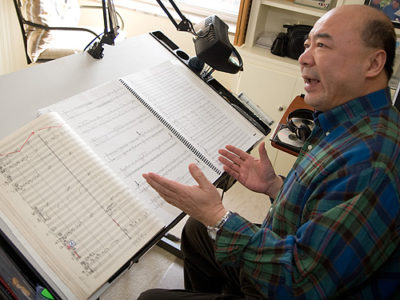Life in China
Zhou, Visiting Professor of Composition at the Conservatory of Music and Dance, started his musical journey in his birthplace of Beijing. There, the appreciation of his illustrious culture was always a part of Zhou Long’s life, as his talented family filled their home with Oriental songs and other Chinese arts.
As a child, Zhou began learning to play the piano. However, it was not until he was sent to a camp away from his home that he began to understand the creative impact of a simple life.
During the 10-year Chinese Cultural Revolution of the 1960s, authorities sought to instill a unity of purpose and an attitude of equality in all citizens. As one step towards achieving these goals, Mao Zedong, China’s leader, closed the schools. He also ordered middle school urban youth from the business and merchant classes – like Zhou – to go live with peasant families on remote farmlands.
There, during the “countryside movement,” Zhou experienced a different life in the wilds with raging storms, with the cycles of the seasons and by living close to the earth. He let these sensations get into his soul, realizing then that he wanted to blend what he saw, heard and felt into new musical expressions; however, he knew it would not be easy.
“The cross-fertilization of color, material, and technique, and – on a deeper level – cultural heritage, was an enormous challenge,” said Zhou.
New Freedom and Opportunities
In the late 1970s, a change in Chinese government resulted in schools reopening, and Zhou was able to attend the Beijing Central Conservatory of Music where he studied composition, music theory and conducting. After graduation in 1983, he was appointed composer-in-residence of the China National Broadcasting Symphony Orchestra. In 1985, on a fellowship to New York’s Columbia University, he began studying for his Doctor of Musical Arts degree.
At that point, Zhou’s talent for blending traditional Western artistry with formal Eastern structure and sound solidified his reputation as a superior composer.
 “I draw some of my themes and inspirations from ancient Chinese poetry,” said Zhou. “There are musical traits distinctly reminiscent of ancient China: sensitive melodies, expressive glissandi – performing with a gliding result by sliding one or more fingers rapidly over the keys of a piano – in various statements and, in particular, a peculiarly Chinese undercurrent of tranquility and meditation.”
“I draw some of my themes and inspirations from ancient Chinese poetry,” said Zhou. “There are musical traits distinctly reminiscent of ancient China: sensitive melodies, expressive glissandi – performing with a gliding result by sliding one or more fingers rapidly over the keys of a piano – in various statements and, in particular, a peculiarly Chinese undercurrent of tranquility and meditation.”
Renown and Reward
Zhou’s compositions appeal to multiple music venues. He has received grants and commissions to compose a flute concerto, piano concerto and chamber works. The Opera Boston and the Beijing Music Festival have commissioned an opera for a premier in 2010.
However, Zhou stays close to, and involved with, his UMKC Conservatory students, encouraging them to develop their own particular musical sensibilities. Are Zhou’s teaching techniques successful?
“Working with Dr. Zhou for my composition was one of my best, most productive semesters,” said composition student Prangcharoen Narong. “Under his instruction, I have composed a woodwind quintet that was performed in more than 15 venues last year, including a major music festival, Lincoln Center in New York and the Library of Congress.”
At international festivals, Zhou has worked with other renowned performers, including Yo-Yo Ma. He has received fellowships, commissions and recording grants from the BBC, Tokyo Philharmonic, CalArts, the Kronos String Quartet, the Library of Congress, the New York State Council on the Arts, the American Academy of Arts and Letters, the National Endowment for the Arts and the Guggenheim and Rockefeller Foundations.
Last fall, Zhou received the ASCAPLUS lifetime achievement award from the American Academy of Arts and Letters for his compositions that unify the East and West.
In spite of the pace, Zhou delights in the workload.
“I compose not just to make a musical statement,” he said, “but to achieve my goal of sharing different cultures in our new society and improving the understanding between people of various backgrounds.”
A UMKC Conservatory Treasure
With all the demands on his time and talent, Zhou is happy to be at UMKC.
“I am amazed that I have been teaching at the Conservatory for almost eight years. I work with very supportive colleagues and excellent students from all over the world. The Composition program at the Conservatory is one of the largest and most advanced in the country, and I enjoy being part of it.”
Prangcharoen Narong voices the opinion shared by other grateful students who consider Zhou an instructor and a friend: “Dr. Zhou has a very good ear and sense of construction in music. With his direction, my music becomes strong.”

